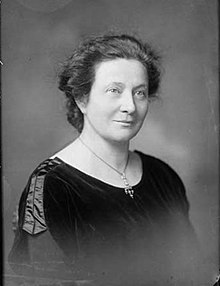Františka Plamínková
Františka Faustina Plamínková (born February 5, 1875 in Prague , Austria-Hungary ; died June 30, 1942, Kobylisy shooting range in Prague-Kobylisy , executed ) was a Czechoslovak women's rights activist .
Life
Františka Plamínková was the youngest of three daughters of the shoemaker František Plamínek and Františka, born Krubnerová, and grew up in Prague on Karlsplatz on. She completed a pedagogical training from 1894, which she completed in 1900 as a teacher of arithmetic, writing, drawing and teaching. She became a member of the teachers' association and campaigned against the celibacy of teachers , which forbade teachers to marry , with the text The Right of Married Women to Paid Employment (cs) .
In 1903 she founded the “Czech Women's Association” (Ženský klub český) with Marie Tůmová in Prague and in 1905 an association for universal suffrage and women's suffrage. In Cisleithanien , men in Bohemia and Moravia were given census voting rights in 1907 , but women were still denied this right. She agitated for the formation of women in local and regional elections in 1907; and in 1908 Božena Viková-Kunětická was elected as the first woman in Bohemia and Moravia. Even if this election result was canceled, the Czech women's movement gained national and international recognition.
After the founding of Czechoslovakia in 1918, women were given the right to vote and stand for election. Plamínková ran on the list of the socialist Czech National Social Party (ČSNS) in the Prague municipal elections in 1919 and was elected. She gave up her teaching profession in favor of politics. In 1925 she was elected to the Senate of Czechoslovakia and regularly re-elected until the German occupation in 1939.

In 1922 she was a member of the Czechoslovak delegation to the General Assembly of the League of Nations . She founded the women's association Ženská národní rada (ŽNR) to fight for equality in civil law and in society. The ŽNR was a member of the International Alliance of Women (IWSA), to whose board she was elected in 1930, and of the International Council of Women (ICW), of which she became vice-president in 1925. In view of the danger of war, she founded the “Czechoslovak League for Peace and Freedom” and organized a conference of peace organizations in Prague.
In 1937 Plamínková took part in the International Study Conference of the World Association for Women's Suffrage and Civic Women's Work in Zurich . During the war, the Ženská národní rada joined the resistance organization Petiční výbor Věrni zůstaneme , which led to repression. Hundreds of the activists were arrested and interned in concentration camps and murdered.
During the German occupation in March 1939, she was arrested and placed under house arrest. After the successful assassination attempt on Reinhard Heydrich , she was imprisoned in the Theresienstadt concentration camp and murdered in June 1942 on the Kobylisy firing range .
In 1992 she was posthumously honored with the Tomáš Garrigue Masaryk Order .
Fonts (selection)

- Občanská rovnoprávnost žen (= Občanská knihovna , Volume 9). Vydáno péči Ministerstva školství a národní osvěty ve státním knihoskladě v Praze, Prague 1920, OCLC 39801048 (Civil equality for women.)
- The attempt at an autobiography , in: Elga Kern (ed.): Leading women in Europe , E. Reinhardt, Munich 1927, pp. 170–182, new edition edited by Bettina Conrad and Ulrike Leuschner. With a foreword by Edda Ziegler, Reinhardt, Munich 1999, ISBN 3-497-01480-X .
literature
- Františka Plamínková , in: June Hannam, Mitzi Auchterlonie, Katherine Holden: International encyclopedia of women's suffrage . ABC-Clio, Santa Barbara, California 2000, ISBN 1-57607-064-6 , p. 238.
- Melissa Feinberg: Elusive Equality: Gender, Citizenship, and the Limits of Democracy in Czechoslovokia, 1918–1950 . University of Pittsburgh Press, Pittsburgh, Pennsylvania 2006, ISBN 978-0-8229-7103-0 .
- Eva Uhrová: Radostná i hořká Františka Plamínková Mediasys, Prague 2014, ISBN 978-80-260-7207-2 .
- Katherine David: Czech Feminists and Nationalism in the Late Habsburg Monarchy: "The First in Austria" . In: Journal of Women's History, Volume 3, Number 2, Fall 1991, pp. 26-45.
- Jana Hradilková: Františka F. Plamínková , in: Alena Wagnerová (Ed.): Prague women: nine life pictures . Bollmann, Mannheim 1995, ISBN 978-3-927901-59-9 , pp. 97-122.
- Portrait of Františka F. Plamínková . In: Margret Krannich (Ed.): The felt and the proclaimed Europe . Klartext, Essen 2011, pp. 67–71. ISBN 978-3-8375-0498-9 .
- Helena Verdel (Ed.): The hundred most important women of the European East . Wieser, Klagenfurt 2003, ISBN 3-85129-421-1 .
Web links
- Literature by and about Františka Plamínková in the bibliographic database WorldCat
Individual evidence
- ↑ Luboš Velek: “The” first female member of the Habsburg Monarchy in the Bohemian Landtag in 1912 , in: Austrian Journal of History , 2/2015, pp. 41–69
- ↑ Květa Jechová: Emancipace shora , in: Paměť a dějiny 4/2013, ÚSTR publications , online at: ustrcr.cz / ...
| personal data | |
|---|---|
| SURNAME | Plamínková, Františka |
| ALTERNATIVE NAMES | Plamínková, Františka Faustina |
| BRIEF DESCRIPTION | Czechoslovak women's rights activist |
| DATE OF BIRTH | February 5, 1875 |
| PLACE OF BIRTH | Prague |
| DATE OF DEATH | June 30, 1942 |
| Place of death | Prague |

